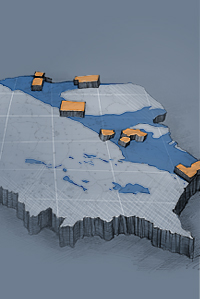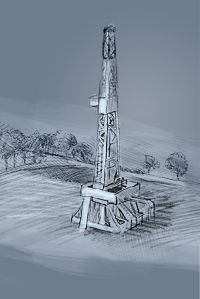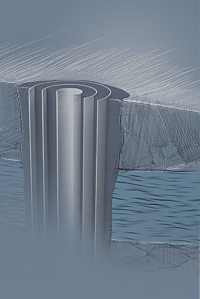Key Events

January
The Supervisory Board appointed the President and members of the PGNiG Management Board for the new joint three-year term of office. The following members of the Management Board were reappointed for the term: Michał Szubski (CEO and President), Radosław Dudziński, Sławomir Hinc, Marek Karabuła and Mirosław Szkałuba.
PGNiG was again listed in the elite group of companies included in the RESPECT Index, a stock-exchange index of socially responsible companies. On January 25th 2011, the Warsaw Stock Exchange published the second edition of the list of companies included in the index.
February
Given the unstable political situation in Egypt and Libya, the Polish employees of PGNiG’s Cairo Branch and POGC Libya were evacuated to Poland and the equipment was secured. Local Egyptian and Libyan employees remained in the countries. In Egypt, the interruption was temporary and did not affect the operations on the licence, whereas in Libya the return to the field is planned in 2012.
March
During its meeting held on March 8th 2011, the Supervisory Board of PGNiG appointed Mr Mirosław Szkałuba Vice-President of the PGNiG Management Board. Mr Szkałuba was nominated by PGNiG employees.
PGNiG, PGNiG Energia SA, Tauron Polska Energia SA, Elektrownia Stalowa Wola SA and Elektrociepłownia Stalowa Wola SA executed an agreement on operation of the special purpose vehicle Elektrociepłownia Stalowa Wola SA, which is to manage an advanced 400 MWe and 240 MWt CCGT gas and steam unit in Stalowa Wola.
On March 21st 2011, PGNiG and OOO Gazprom Export signed an annex to the contract for sale of natural gas to Poland. Under the annex, the maximum daily contracted gas deliveries were increased from 9.36 m m³ to 13.95 m m³ (acc. to the Polish standard). The annual contracted volume of gas to be accepted by PGNiG in 2011 remained unchanged at 9.77 bn m³. Increased daily supplies were necessary after the dramatic drop of air temperatures in the second half of February 2011. The annex remained in force until December 31st 2011.

April
On April 15th 2011, PGNiG disposed of 4,000,001 shares in Zakłady Azotowe w Tarnowie-Mościcach SA with a par value of PLN 5 per share, at a price of PLN 37.00 per share.
The Annual General Meeting of PGNiG approved the financial statements and the Director’s Reports on the operations of PGNiG, as well as the consolidated financial statements and the Director’s Report on the operations of the PGNiG Group, and granted discharge to members of the Management and Supervisory Boards of PGNiG for the financial year 2010. Approving the Ministry of State Treasury’s proposal, the Annual General Meeting allocated PLN 708 m to dividend payment (PLN 0.12 per share).
May
PGNiG released its Q1 2011 financial report. The geological, geophysical and exploration companies significantly contributed to a slight increase in the Group’s performance in Q1 2011. Overall, the PGNiG Group’s net profit increased 3%, to PLN 1.02 bn in Q1 2011, compared with PLN 996 m in Q1 2010. Over the same time, the Group’s operating profit fell 4% year on year, to PLN 1.18 bn in Q1 2011. The operating profit was adversely affected by the lower profitability of natural gas sales.
PGNiG and Vitol SA of Geneva executed a contract for the supply of about 550 m m³ of natural gas through the newly built interconnector on the Polish-Czech border in the Cieszyn area. The value of the contract was approximately EUR 550 m. Supplies were to commence on October 1st 2011 and last until October 1st 2014, which would enable PGNiG to use 100% of its throughput capacity in the pipeline, acquired under the open-season procedures conducted by Gas Transmission Operator Gaz-System SA (OGP Gaz-System SA). The new interconnector enhances Poland’s energy security, as it handles gas supplies to Poland from the south.
June
PGNiG updated the Group’s strategy until 2015. The Company’s overarching strategic objective is to increase the shareholder value and to continue growth as an energy conglomerate. The strategy will be implemented taking into consideration the need to ensure long-term security of uninterrupted natural gas supplies to the Polish market.
Attainment of the strategic objectives will rely in particular on activities concentrating in three areas, including:
- hydrocarbon exploration and production domestically and abroad, to ensure access to new oil and gas reserves;
- the power sector, focusing on the development of gas-fired power generation in Poland;
- management of the Company’s natural gas portfolio and activities on the European gas trading market.
PGNiG plans to spend around PLN 27 bn in 2011–2015 on the implementation of the Strategy. More than a half of this expenditure will be applied towards exploration for and production of natural gas and crude oil both in Poland and abroad.
The President of the Energy Regulatory Office approved the tariff for gas fuels (Part A – supply of gas fuels – No. 4/2011). Average prices and charge rates for the supply of high-methane gas E, Lw nitrogen-rich gas and Ls nitrogen-rich gas were increased by 8.9%, 7.6% and 6.3%, respectively.

July
PGNiG signed annexes to the Note Issue Programme concluded with six banks in 2010. Under the annexes, the maximum value of the Programme was increased from PLN 3 bn to PLN 5 bn and the Programme’s maturity was extended by two years, with the final repayment date set on July 31st 2015.
August
The FPSO vessel was anchored on the Skarv field in the Norwegian Continental Shelf.
PGNiG SPV 1 Sp. z o.o. and Vattenfall AB executed a memorandum of understanding concerning the sale of 24,591,544 shares in Vattenfall Heat Poland SA, representing over 99.8% of the company’s share capital. After the Stalowa Wola project, the purchase of Warsaw CHPs marks another phase of PGNiG’s development into an energy conglomerate.
Moody’s reduced PGNiG’s rating outlook from “stable” to “negative”, and maintained the rating at Baa1. The lower outlook reflects the threats inherent in PGNiG’s development plans for the upstream segment, the segment’s financing requirements and the business risk being higher than the risk of the PGNiG Group’s core business in terms of performance volatility.
On August 25th 2011, PGNiG, PGNiG Finance AB (a subsidiary) and three banks: Societe Generale, bnP Paribas and Unicredit Bank AG signed the documentation for the issue of Eurobonds of up to EUR 1.2 bn. Under the five-year programme, PGNiG Finance AB may issue bonds with maturities of up to ten years, bearing interest at fixed and variable rates. PGNiG Finance AB will apply the proceeds from the bond issue towards an on-loan for PGNiG, which intends to finance its investment programme with the borrowing.
PGNiG released its H1 2011 financial report. The PGNiG Group recorded a net profit of PLN 1 bn, with a 7% year-on-year increase in sales revenue, to PLN 11.5 bn in H1 2011. In H1 2011, the growing cost of gas purchases reduced the margin on gas sales, which adversely affected the Group’s financial performance. However, the adverse effect of the negative margin was partially offset by the increased profitability of the Upstream segment and the gain on disposal of shares in Zakłady Azotowe w Tarnowie Mościcach SA.

September
In Lubocino near Wejherowo, the first shale gas flow was recorded in PGNiG’s licence area (for further information on shale gas, see the Exploration and Production section of this report).
PGNiG completed extension of the Strachocina underground gas storage facility.
October
PGNiG Norway AS executed an agreement on sale of crude oil with Shell International Trading and Shipping Company Ltd. The price of crude oil will be linked to Brent Dated prices and payments for the delivered crude will be settled in the US dollars. The agreement was executed for an indefinite term and will become effective in the month of the production launch.
November
PGNiG started to import gas on a virtual reverse basis. It enables the Company to increase the annual volume of natural gas imported to Poland over the Yamal pipeline to around 2.3 bn m³.
PGNiG requested OAO Gazprom and OOO Gazprom Export to initiate arbitration proceedings before the Arbitration Tribunal of Stockholm. The proceedings relate to the pricing terms currently governing settlements for delivered gas.
PGNiG released its Q3 2011 financial report. The Group recorded a net profit of PLN 319 m in Q3 2011, down by PLN 26 m year on year. The decrease is mainly attributable to a 4 pp decrease in the margin on high-methane gas sales, from 2% in Q3 2010 to −2% in Q3 2011. The decline was caused by the 27% year-on-year increase in the unit price of imported natural gas.
Standard & Poor’s Financial Services increased PGNiG’s rating outlook from “negative” to “stable”. The Company’s rating of BBB+ was maintained.
On November 25th 2011, PGNiG signed annexes to the Note Issue Programme of June 10th 2010. Under the annexes, new banks joined the Programme and the maximum value of the Programme was increased from PLN 5 bn to PLN 7 bn. The final repayment date remained unchanged (July 31st 2015).
The President of the Energy Regulatory Office approved a tariff for gas fuel storage services (No. 1/2011). Under the new tariff, prices went down by 3% on the previous tariff. The introduction of the new tariff was related to providing access by PGNiG to additional storage capacities.
December
The Act on Reserves of Crude Oil, Petroleum Products and Natural Gas came into force. The Act allows mandatory reserves of natural gas to be maintained in storage facilities outside Poland (in the EU or EFTA countries). Such a solution is permitted provided that the delivery of those reserves to the Polish transmission or distribution system within 40 days is guaranteed. The Act also provides for increasing, from 50 m m³ to 100 m m³, of the annual limit of gas imports entitling the importer to apply for exemption from the obligation to maintain gas reserves. Further, the obligation to maintain gas reserves would exclusively apply to companies, which import gas for resale to customers in Poland.
Mr Michał Szubski resigned from the post of CEO and President of the PGNiG Management Board. From January 1st 2012 to the conclusion of recruitment proceedings, Mr Marek Karabuła, Vice-President in charge Petroleum Mining, supervised the matters within the powers of the Board President, including the operation of the PGNiG Management Board.




